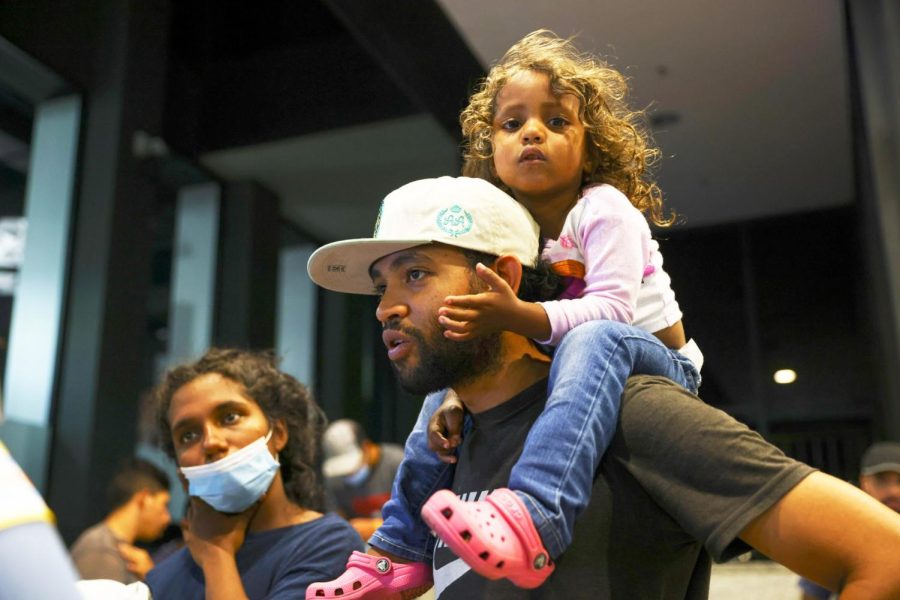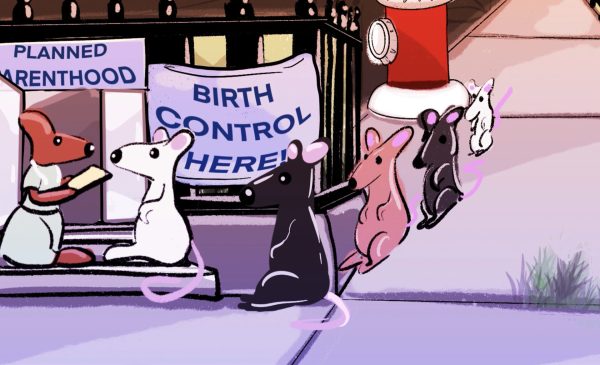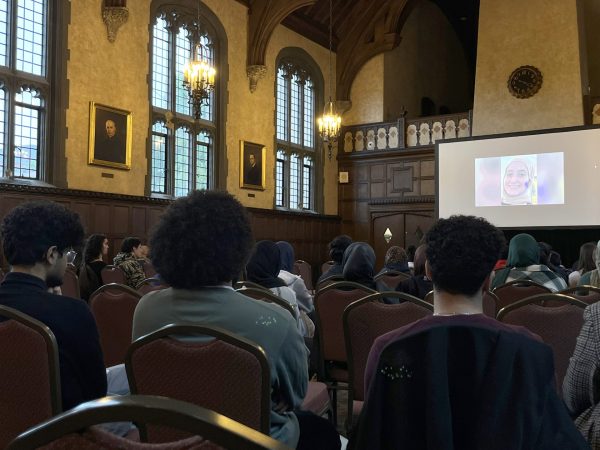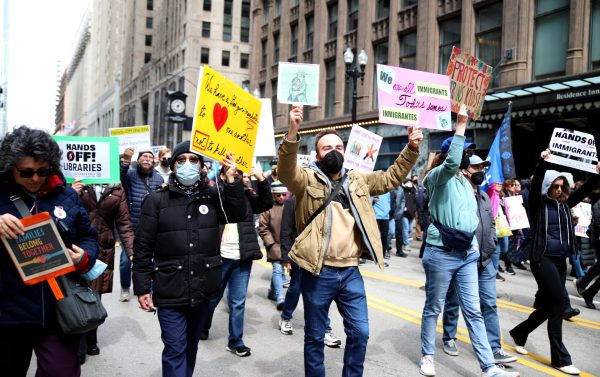State abandons plan to house migrants at shuttered Kmart on Southwest Side
Credit: Anthony Vazquez, Chicago Sun-Times | AP/The DePaulia
Cataleya sits atop her father, Elier as he speaks to a police officer while other migrants wait for a bus to take them to a refugee center outside Union Station in Chicago on Aug. 31, 2022.
The Illinois Department of Human Services (IDHS) abandoned plans to house more than 600 migrants in a former Kmart storefront in Chicago’s West Lawn neighborhood. The announcement came earlier this March from Representative Angelica Guerrero-Cuellar. The move comes weeks after the city faced criticism for placing migrants in a former elementary school in the Woodlawn neighborhood.
“I have serious questions and concerns about the safety and humanity of the proposed Kmart facility and its amenities,” Guerrero-Cuellas said in a letter she wrote in February to the Secretary of IDHS, Grace Hou. “I have asked state agencies to pause this project until they can ensure this facility is constructed into adequate housing for young migrant families.”
IDHS did not respond to multiple requests by The DePaulia for this story.
In the letter, Guerrero-Cuellar also asked for more specifics about the proposed plan to repurpose the closed Kmart for the migrants, including a construction timeline, how long migrants would be living there, security in the facility and how funding will be allocated for CPS.
IDHS chose the site because of its location near an immigrant welcoming area, and its proximity to local resources, according to WTTW.
Alderwoman Silvana Tabares’ (23rd Ward) office reiterated that the decision to move migrants into the old Kmart was solely a state decision, not the city’s.
Tabares told the Greater Southwest Herald that she questioned the safety and potential lack of planning for both the migrants and local residents.
“I’ve spoken with our local state elected officials and have urged them to engage the local community before this process proceeds any further. We need a plan that ensures the safety of the community and its residents,” Tabares said in a document sent to The DePaulia.
Baltazar Enriquez, the president of the Little Village Community Council and a community advocate who has been helping some migrants to settle down in Chicago questioned the state’s understanding of the neighborhoods in which they choose to house migrants.
“The governor [Pritzker] doesn’t even live here in Chicago, and he wants to make decisions in neighborhoods that he doesn’t even have a clue [about],” said Enriquez.
Enriquez said he is concerned over potential safety hazards in the area.
“Why would you put people [in] a commercial area? There’s high levels of traffic there,” he said. “These [migrants] could get run over. These people could go through getting assaulted.”
Many migrants that have arrived in Chicago over the past seven months are being housed in hotels in the suburbs, including Burr Ridge, Countryside, Elk Grove Village, and Prospect Heights.
Some suburban residents expressed their discontent with the city and state for placing migrants in shelters in their towns with short notice.
In Elk Grove Village, Mayor Craig Johnson released a statement last September, expressing disappointment with state officials.
“I cannot tell you how disappointing it is to see the haphazard way in which this has been handled by county, state and City of Chicago officials,” Craig Johnson said in a press release.
In Prospect Heights, over 200 migrants are staying in hotels. With the Chicago mayoral runoff election only days away, the housing of the migrants in the city is a major topic.
Enriquez said that he is concerned because the candidates that are running for mayor have not touched on the issue more elaborately throughout their campaign.
Paul Vallas’ campaign website currently does not list any type of plan for housing migrants. Brandon Johnson’s campaign website pledges to “[l]everage the collective braintrust of community groups, leaders, multiple city agencies to develop a comprehensive city plan for asylum seekers and other new arrivals.”
Johnson’s site also outlines key housing policies that could potentially impact migrants, by providing “rental assistance or other semi-permanent housing for all, provided by the City. Build permanent housing for all unhoused, including asylum seekers, by passing the Bring Chicago Home ordinance and enacting other pieces of the $1 billion Better Chicago Agenda”.
While there has been no official release as to where the migrants will be staying now, WTTW reports that “a source close to the situation said some of them have found places to live independently. The source said others will continue to stay at hotels, mostly in the South and Southwest suburbs.”











